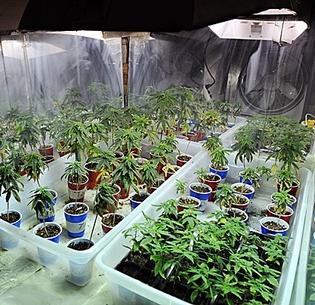As I was going through the marijuana news today, I came across this great article from The Bozeman Daily Chronicle about the struggles and rewards of medical marijuana growers:
Standing in an indoor-growing barn where hundreds of marijuana plants are becoming tall and lush under bright lights, partners Robert Carpenter and Blake Ogle know it looks like they’ve got a gold mine.
Yet they’re quick to tell visitors that making a profit in the medical marijuana business is a lot tougher than it looks.
Plenty of Montanans have gone into this figuring it’s an easy way to get rich quick. After all, medical marijuana sells for $200 to $350 an ounce.
Yet Carpenter said probably 18 out of 20 growers who started out when he did have failed. Busted producers selling off their used equipment has become a “huge” market.
“You do not put a seed in the ground and a million dollars comes out,” said Carpenter, 29, president of the company, A Kinder Caregiver. “This year we took a $60,000 loss; it was $8,000 the year before.”
Finally, after two years, “we’re starting to see more blue sky,” said Ogle, 35, company vice president. He grew up in a prominent Bozeman business family, the longtime owners of Kenyon Noble Lumber and Hardware.
The partners stressed they’re striving to build a legitimate, well-run, ethical business, to avoid a “Captain Wow” image, and to cooperate with law enforcement. They said they “buy local” and support hometown businesses like Owenhouse Ace Hardware, Kenyon Noble, Murdoch’s and Zig’s.
“We are trying to be an above-board business,” Carpenter said. “We pay our taxes like any other S-corporation.”
Despite their protests about the difficulty of turning a profit, business is booming. To keep up with demand, A Kinder Caregiver will soon double its capacity to grow medical marijuana.
These entrepreneurs, operating on the frontiers of a wild new industry, face both great opportunity and great risk.
A Kinder Caregiver, one of the first medical marijuana businesses to obtain a Bozeman business license, has already grown to the point it has five partners, 15 employees and around 270 patients in Bozeman, Butte and Billings. Their Bozeman storefront on Griffin Drive is discreet, they said.
“Our payroll is almost $60,000 a month,” Ogle said. “We’re going to have health insurance and dental.”
“And profit sharing,” Carpenter said. “We’re setting up a 401k” retirement plan.
Despite such success, anything from an infestation of spider mites to changes in state law or a power shift in Washington could put them out of business – or worse.
Because the law is not clear cut, they’ve spent a small fortune on attorney fees, trying to figure out what’s legal. At first they weren’t sure if they could hire employees.
“Every decision you make is a scary one. … It’s a fine line from a felony,” Carpenter said. Under state law, “This many ounces is OK – but one ounce over and it’s a felony and you guys are going to jail for 20 years. That’s crazy.”
They said their company has created work for plumbers, concrete workers, roofers, painters, and sheet rock and air duct installers.
Their existing 60-light growing barn came on line in January, costing roughly $150,000 to build. It will soon be joined by a new 100-light barn, in which they expect to invest more than $60,000 on equipment, apart from the landlord’s investment in the building. They insisted the location not be publicized for security reasons.
They’ve spent another $60,000 renovating their storefront.
Their first growing barn is impressive. At the entry, kelp and bat guano soak in three big vats of water, making an organic nutrient tea for the plants. Carpenter said most growers will spend $7.40 a gallon for store-bought fertilizer, but their home-made nutrients cost just 11 cents. They also make their own soils.
“We’re farmers,” Carpenter said proudly.
In the main growing room, air ducts and grow lights hang from the ceiling over 60 big Rubbermaid tubs – normally sold as horse troughs – that hold six growing plants each. Every tub is numbered and set on a wheeled dolly, made in Belgrade.
It’s a “perpetual motion” system, Carpenter said. Every day new plants are planted, so there’s a steady stream of plants on the 60-day march to maturity.
A white board keeps track of every tub and whether it’s growing AK-47, Pink Dumptruck or another strain. Some plants are bred more from “indicas” – northern strains that bloom fast but tend to give patients “couch lock” – while other plants are more “sativas” – from hot places like Mexico, which grow slowly but give a more “uppity euphoria” like coffee, Carpenter said.
Other growers may sell marijuana that has been attacked by fungus or molds, he said, but they refuse to sell any plants that aren’t good quality.
“We shut a facility down because we got insects, and because of that, we lost $200,000 six months ago,” Carpenter said. He told the story to underline “the difference between ethical care-giving and people trying to crank out as much product as they can.”
Carpenter, a one-time “rainbow” hippy from South Carolina, was working in construction in the Bozeman area until the building boom went bust.
After losing his house and his car, he ended up living one cold winter in a “scary” trailer with no running water. He had obtained a medical marijuana caregivers license four years ago and started growing plants in his closet.
At first it was a “hard battle,” he said, requiring long hours to tend to his plants. But as he gained a successful track record, he brought his business plan to private investors. Banks don’t give loans to marijuana growers.
“Luckily, I didn’t have to go to anybody named Tony,” Carpenter joked.
Ogle, who wears tattoos and large ear plugs, has degrees from the University of Montana in tourism and recreation and in agricultural business.
“Mom said, ‘I always thought you’d get into farming, but I never thought it would be this,'” he said.
Ogle said he became interested in the marijuana business four years ago, after seeing his late father, Bill, dying of leukemia and suffering under standard medical care.
“I started thinking there has to be a better way to treat this,” Blake Ogle said. He found studies that show marijuana can be beneficial for patients with cancer, Parkinson’s and Alzheimer’s diseases.
Ogle said when A Kinder Caregiver partners got started two years ago, lots of people said they were crazy and would go to jail. Now the same folks are calling up, wanting to invest in their business.
Whether A Kinder Caregiver has a future will be in the hands of Montana lawmakers. If all goes well, Ogle said, they’ll expand and turn a profit.
But if the 2011 Legislature repeals the medical marijuana law, Ogle said, “We could be growing organically grown tomatoes.”
They could end up “sipping toddies in Barbados, Carpenter said, with a wry smile, “or in a federal penitentiary.”




